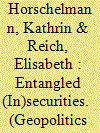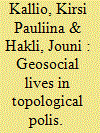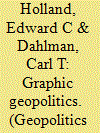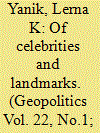|
|
|
Sort Order |
|
|
|
Items / Page
|
|
|
|
|
|
|
| Srl | Item |
| 1 |
ID:
153736


|
|
|
|
|
| Summary/Abstract |
This article seeks to re-understand climate change in terms of its constitutive state practices. Existing analyses tend to frame climate change as a security discourse, or as a manner of green governmentality normalising the uneven relations between the Global North and South, but seldom is the practical process realising climate change’s logics delineated. Using aviation as an example, this article traces how climate change, as discourse, contingently takes shape through three episodes in aviation’s environmental evolution: a) an initial period of conceptual experimentation and consolidation (1992–2005); b) a major policy break catalysed by the EU ETS that destabilised previous discursive formations (2005–2012); and c) diplomatic attempts to re-gain international consensus following the EU ETS’s extension to aviation (2012–present). These practices will be charted across numerous spaces, including supra-national forums, national governments, technical bodies, consulting agencies, and political summits. By elucidating this geopolitical praxis across the North-South divide, I demonstrate how climate change cannot simply be reduced to a rationality in green governmentality, but must be understood as an outcome of strategic practices among differently positioned states.
|
|
|
|
|
|
|
|
|
|
|
|
|
|
|
|
| 2 |
ID:
153729


|
|
|
|
|
| Summary/Abstract |
This paper makes the case for a broadening of conceptual vocabularies in security studies by extending the sub-discipline’s predominantly geopolitical focus to the ‘geosocial’. Based on a review of work on human security and of feminist and anthropological research on (in)security and violence, we argue that there remains a need for further conceptual development to which geosocial approaches can make a significant contribution. They move us beyond compartmentalisation towards understanding social relations as a key medium through which connections between different forms of (in)security are forged. This prompts the mapping of a wider kaleidoscope of intersecting security issues, experiences, practices, subjects and topographies that include, but are not exhaustively explained by, geopolitical and geoeconomic processes. Drawing on findings from a participatory research project conducted with marginalised young people in Leipzig (Germany) between 2014 and 2015, we argue for greater attention to four issues that are rarely thematised in security studies and which geosocial approaches bring more squarely into focus: 1) social relations as a key connective tissue through which different dimensions of (in)security are entangled and through which these entanglements are given shape; 2) social relations as sources of security and insecurity; 3) security practices as including the emotional and practical labour invested in sustaining, moulding or dealing with the breakdown of social relations; and 4) the topographic stretching and hybridisation of social relations that furnishes not just cultures of fear but can also generate greater senses of security.
|
|
|
|
|
|
|
|
|
|
|
|
|
|
|
|
| 3 |
ID:
153739


|
|
|
|
|
| Summary/Abstract |
Conflicts remain an integral part in shaping the world. Tensions on the Korean Peninsula are no exceptions. The Korean DMZ (Demilitarized Zone) World Peace Park has been proposed to help obtain peace by erasing the memories of war and creating new beginnings of trust, cooperation, and unity on the Korean Peninsula. With their ties to geographical space and conflict, peace park research provides an excellent platform for both activism and research in positive peace. Little, however, is known about peoples’ willingness to pay (WTP) for the creation of peace parks, in general, and specifically for the development of the Korean DMZ World Peace Park. Using contingent valuation methods, the weighted average WTP for development of the Peace Park is $49.03 per household per year. It appears South Koreans are willing to pay not only for the conservation of the DMZ, but also for the peace and unification of the Korean Peninsula the Peace Park may bring to the area.
|
|
|
|
|
|
|
|
|
|
|
|
|
|
|
|
| 4 |
ID:
153731


|
|
|
|
|
| Summary/Abstract |
New actors and ideas about poverty management and humanitarian assistance have arisen in recent years. The underlying context of this shift includes a growing awareness of the limitations and failures of both military forms of humanitarian intervention and unfettered market-based solutions to aid and development. This paper explores the particular form that global humanitarianism is taking in this millennial context. I argue that a new configuration of humanitarian reason is emerging that draws on both neoliberal and pastoral rationalities of governance. The former can be associated with efficiency, transparency, and quantitative evidence, while the latter is articulated with individual compassion, devotion, and Christian duty. Using the celebrity humanitarian Bono and his rhetoric of ‘factivism’ as an illustrative example, the paper explores the way that this message is transmitted through geosocial discourses and networks. It indicates some of the ways that the personal and media dissemination of this new ideology of charismatic, yet rational care helps to weave pastoral rationalities into forms of political authority.
|
|
|
|
|
|
|
|
|
|
|
|
|
|
|
|
| 5 |
ID:
153717


|
|
|
|
|
| Summary/Abstract |
This paper conceptualises the geosocial by examining the transnational connections of African student migrants and their educational experiences in Chinese cities. While there is now an established scholarship on Chinese migration to Africa, new research on the concurrent flow of African migration to China is emerging. Recent publications on African migrants in China tend to focus on the experiences of African traders, drawing out issues of illegality, ‘low-end’ globalisation and their impacts on Chinese trading cities. In comparison, this paper shifts the analytical lens to African educational migration in Chinese cities, foregrounding how global householding patterns reflect and leverage on the geopolitical and geo-economic dimensions of China-Africa relations. The paper shows that individual and family goals are negotiated through educational migration that, on the one hand, is concerned with accumulating human and cultural capital through a learning stint in Chinese cities, and on the other hand, is framed by perceptions of China-Africa relations. The paper argues that through educational migration, transnational social reproduction links Africa with China, but the social differentiation and everyday sociality that the African students experience in Chinese cities reinforce racial coding and development asymmetries. In so doing, the paper draws out how the geosocial reflects and constitutes the geopolitical and geo-economic dimensions of transnationalism.
|
|
|
|
|
|
|
|
|
|
|
|
|
|
|
|
| 6 |
ID:
153730


|
|
|
|
|
| Summary/Abstract |
Geopolitical events and developments can hardly be detached from the mundane lives where people confront politicised and politicising matters, share meaningful experiences, build attitudes, and take action. To contribute to understanding how large-scale geopolitics connect with the everyday, this article draws attention to political subjectivity as the condition of possibility of political agency and polis as the geosocial context of political life as experienced, conceived, and practised. Empirically, the paper engages with the tragic end of Mohamed Bouazizi’s life and scrutinises his role in the events and developments generally known as the Arab Spring. Our analysis contests both the dominant interpretation that postulates political import to his acts, and the alternative account that underscores his apolitical stance. Instead, we propose that the international politicisation of Mohamed Bouazizi’s agency unfolded as an accomplishment of many individual and collective actors, including Bouazizi himself in his struggle to cope with emergent aspects of his everyday life.
|
|
|
|
|
|
|
|
|
|
|
|
|
|
|
|
| 7 |
ID:
153745


|
|
|
|
|
| Summary/Abstract |
Joe Sacco is best known for works that blend journalism with the format and structure of comic books. Sacco’s prior work has considered themes of political conflict, legacies of violence, and marginalization across a range of geographic contexts, including Bosnia, the Middle East, and the United States. This interview, conducted by the authors with Joe Sacco on 16 November 2015, explores these and other themes in an attempt to situate the positionality and choices of the creator of geopolitical narratives in the broader literature on critical geopolitics. We consider the themes of subject, representation, audience response, and stylistic influences, among others, in our conversation.
|
|
|
|
|
|
|
|
|
|
|
|
|
|
|
|
| 8 |
ID:
153742


|
|
|
|
|
| Summary/Abstract |
This paper analyses the (re)production of Turkey’s liminal-hybrid representations through a combination of sports and music celebrity interventions on a specific landmark. It shows that a country’s representations can be reinforced and reaffirmed with the help of celebrities performing their talent on landmarks such as the Bosphorus Bridge and (in some cases) placing another landmark – Ortaköy Mosque – in the backdrop. Combined with the role of celebrities, these two landmarks that have come to symbolise Turkey’s liminality and hybridity visually, in a very mundane manner, aim to add a cosmopolitan component, a banal one though, to the national identity. This further shows that national identity is not always made and shaped by the citizens of that country, but rather foreigners can actively contribute to certain elements of an identity. The paper also draws attention to the role of the states in the making of celebrity politics, refocusing the attention from politician celebrity interaction to state and celebrity interaction.
|
|
|
|
|
|
|
|
|
|
|
|
|
|
|
|
| 9 |
ID:
153726


|
|
|
|
|
| Summary/Abstract |
Theorising situated knowledge formation in relation to geopolitics, geoeconomics and the geosocial, this article adds to the growing literature that evaluates Massive Open Online Courses (MOOCs) by studying who actually participates in them, how, and with what sorts of outcomes. Doing so, this article argues against a geoeconomic view of MOOCs as the revolutionary technology of borderless ‘flat world’ education. Instead, it outlines the far-from-borderless landscape of MOOC participation in terms of geosocial unevenness using evidence from the discussion boards of a global MOOC on globalisation. Based on this empirical evidence, this article suggests that MOOCs can enable forms of connective action through online educational networking, but that these forms of cyborg knowledge formation are possible precisely because they are not ‘borderless, gender-blind, race-blind, class-blind and bank account blind’.
|
|
|
|
|
|
|
|
|
|
|
|
|
|
|
|
| 10 |
ID:
153722


|
|
|
|
|
| Summary/Abstract |
As US deportations and repatriations climbed to unprecedented levels, half of Mexican immigrants deported have at least one family member who is a US citizen, and one in five have at least one child who is a US citizen. This paper applies the analytic of forced transnationality, extending its scope beyond one person’s deportation to reveal cascading effects of travel and trauma for families remaking lives across the US-Mexico border. To do so, our research draws on interviews with mixed-status families, where transnational children have legal permission to reside in the US (including citizenship) and live with caregivers (like parents) who do not. In the wake of the rupture of prolonged detention and deportation, families seek to suture themselves as a collective social subject that is reshaped by forced transnationality.
|
|
|
|
|
|
|
|
|
|
|
|
|
|
|
|
|
|
|
|
|